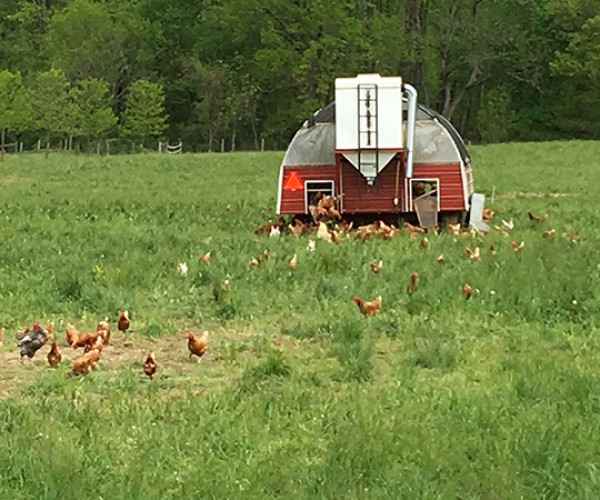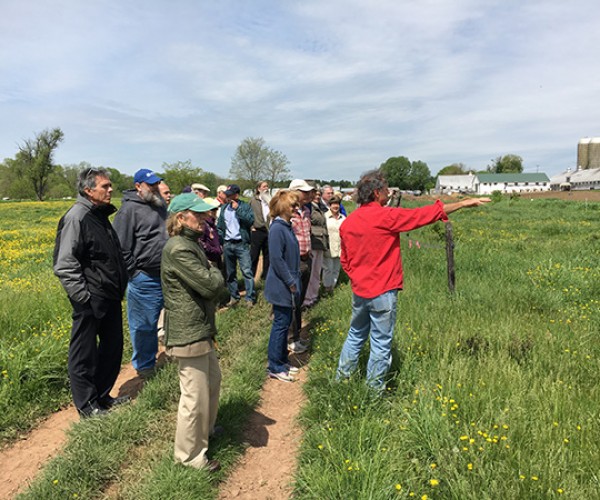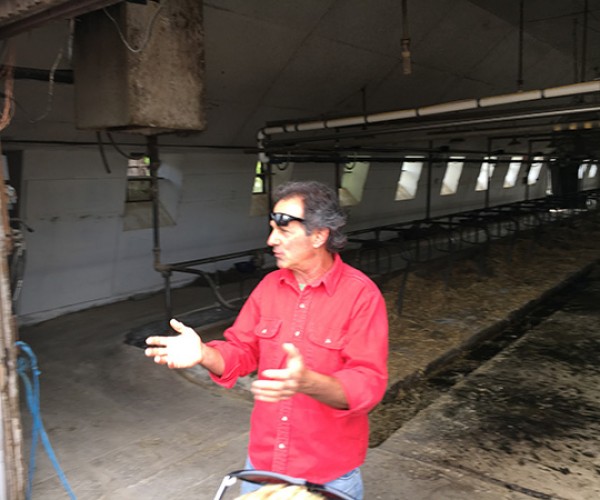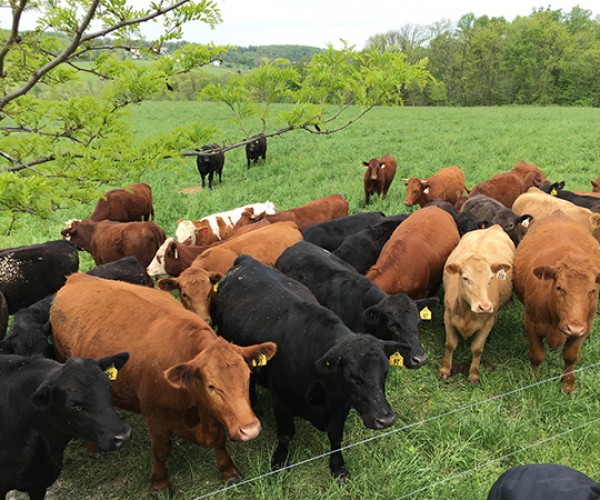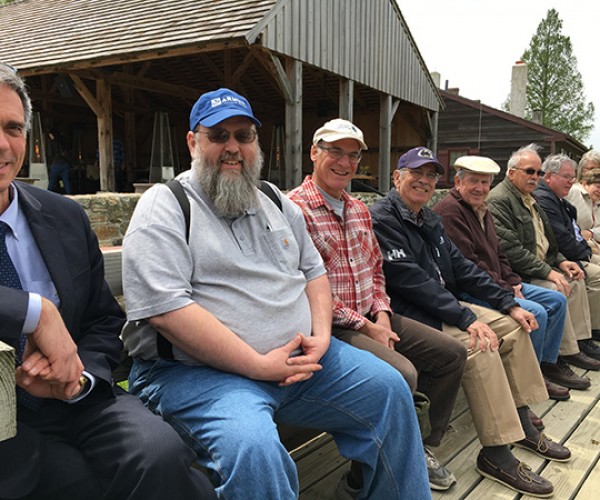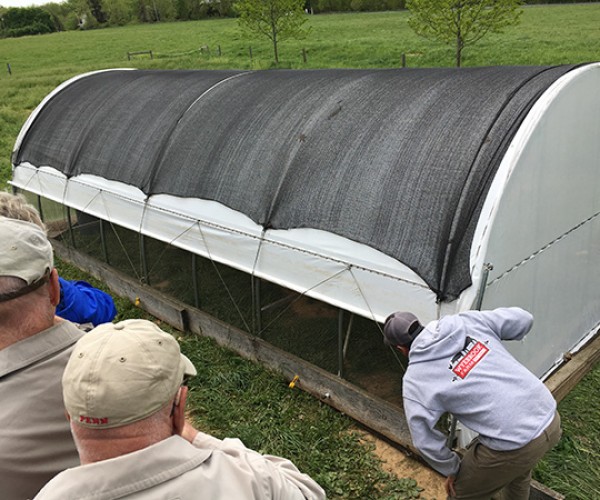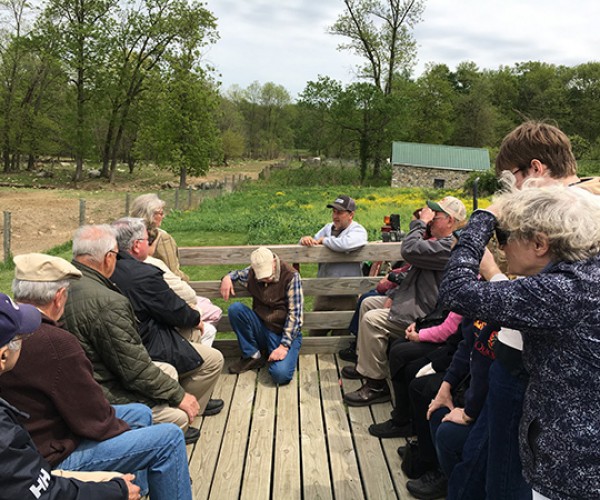In the past farmers and their crop and livestock products were closely linked to the consumers of their products. Most farmers today now supply food processors and marketing organizations so there are many steps between farm and fork. It is estimated that farmers today get an average of 15.6 cents of the dollar value of any food products. This favors larger scale farms that can reduce their unit production costs through volume production. How do smaller farms survive and flourish?
Today most small and even medium sized farmers need to have another job. Those depending exclusively on farming have to work hard and use their wits to survive. Particularly if farmers live within reach of affluent communities, there is a definite market for selling direct to consumers at farmers markets, farm outlets and to restaurants. Adding value to their products by processing or packaging is also effective.
Members of the Philadelphia Society for Promoting Agriculture visited two farmers in Chester County on Thursday 4th May who successfully used their marketing skills to supply higher value products.
Mark Dunphy’s philosophy is clear for his 420 acre Seven Stars Farm outside Phoenixville. The farm is not just organic it is biodynamic so both the Jersey dairy cows and the pastures must be managed sustainably without use of any chemicals or even organic fertilizers. The cows are typically out in the pastures for 120 days/year. The Jersey cows produce butter-fat rich milk (around 5.4%) so that very rich and high quality yogurt can be produced. Virtually all the feed for the cows is produced on the farm and the pastures are meticulously managed for grazing and to produce feed for the long winter months.
The cows are milked twice each day. The milk is pasteurized and yogurt is produced in the processing plant on site which is in production every day. Two major cultures with several other cultures to aid the digestion system are added to the milk but there are no other additives except for the lemon and maple syrup flavors. However most of the yogurt is sold unflavored. The yogurt also contains no antibiotics or GMOs and is refrigerated and distributed throughout the Eastern U.S. under their own label. The demand for their yogurt is so great that Seven Stars only gets half their milk from their own cows so contracts have been signed with several nearby farms to produce milk under all the conditions that govern their own production.
Wyebrook Farm in Honey Brook was the second farm visited. Dean Carlson left a successful career as a New York investment banker in 2009. In his extensive reading on farming and food he had read that it was claimed that ten calories of fossil fuel energy are required to produce one calorie of food. In 2010 he purchased the 330 acre Wyebrook Farm, added 30 acres, renovated the buildings and started work on developing the farm and establishing a sustainable system of producing meat and eggs on his farm.
Dean believes that animals are meant to live outside and their welfare must be taken into consideration.. A mixture of beef breeds were grazed on the pastures managed so that they provide optimal grazing. Hens are also raised on the pastures but have special mobile structures to lay their eggs and provide shade and shelter. A very devoted dog guards the hens 24 hours from foxes, coyotes and even hawks which can make some fatal dives from the sky. Broilers also graze in mobile shelters that are moved every day to fresh grass. Heritage breed pigs with their superior tasting meat live blissfully in the woods and supplement their feed with nuts and vegetation. The beef cattle and pigs are slaughtered at an accredited USDA facility and the carcasses brought back for butchery in Wyebrook’s special premises attached to the restaurant. The meat is then available for use in the restaurant, for sale in the farm store or at the Reading Terminal Market. The cattle breeds – mainly Angus and Devon – are considered to provide the highest quality beef.
The restaurant has become popular and allows diners to eat their meal knowing that most of the ingredients come from the farm around them, even the vegetables grown during the summer. The usual differential between direct sales at retail price for top sirloin is typically 25% of the retail price. Clearly there have been significant costs in establishment and staffing but the result is a more profitable enterprise
PSPA members left the farms with recognition of the value of adding value to farm products either by marketing high quality yogurt or appreciating the interest in local residents eating locally produced food. The emphasis on a high level of sustainability was also apparent. Hard work and absolute dedication to their work was evident and critical to their success. Farms are no longer just ways of life as they first must be good businesses.


